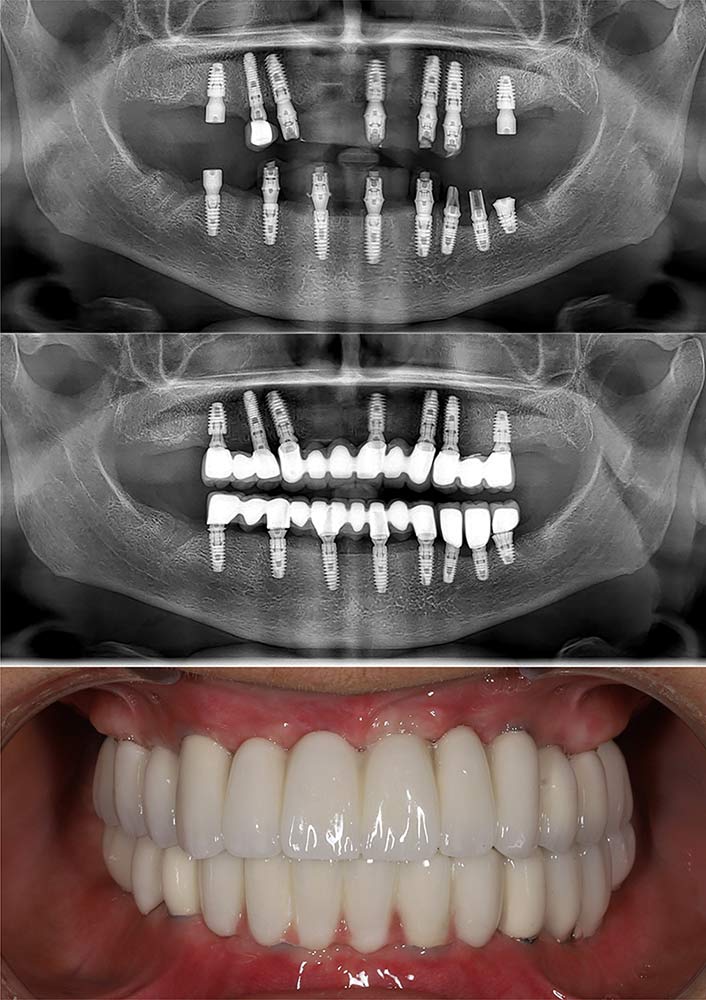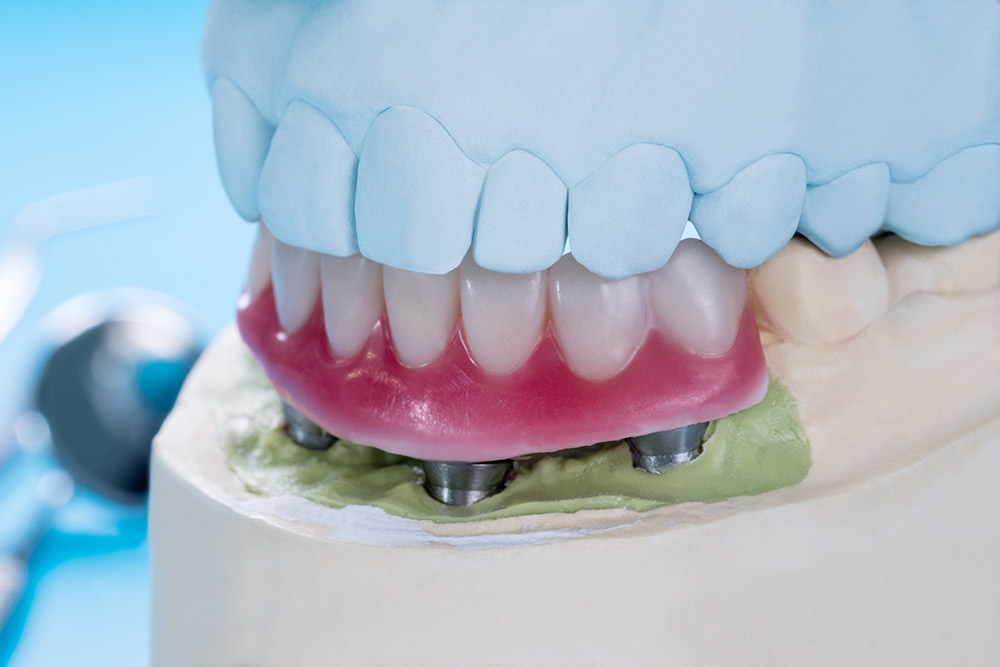Posted March 27, 2024 in Dental Implants, Denture

Losing several teeth can significantly impact one’s overall quality of life, and missing an entire arch can have far-reaching consequences. Whether due to age, trauma, or gum disease, tooth loss can affect chewing ability, speech, and self-confidence. Fortunately, advancements in modern dentistry offer a range of full-mouth replacement options to restore oral health, function, and aesthetics. This blog explores various options for full-mouth tooth replacement, including individual dental implants, implant-supported dentures, and traditional dentures.
6 Min Read:
What Is Full Mouth Tooth Replacement?
Teeth are vital body parts that many take for granted until problems arise. Also known as full arch restoration, full mouth tooth replacement usually involves replacing all missing teeth in the upper or lower dental arch with dental implants or implant-supported dentures. However, an entire arch of teeth can also be replaced with traditional dentures.
Individual Dental Implants

This comprehensive approach using individual dental implants is designed to restore the function, aesthetics, and stability of a dental arch of teeth. This option provides patients with a permanent solution for missing teeth.
Individual dental implants represent the gold standard for full mouth replacement due to their durability, stability, and natural appearance. Dental implants consist of titanium posts surgically placed in the jawbone, serving as artificial tooth roots to support individual crowns, bridges, or full-arch prostheses.
Benefits of Individual Dental Implants
Unlike traditional dentures, dental implants stimulate the jawbone and preserve facial structure by preventing bone loss. Individual dental implants allow patients to enjoy a natural-looking smile and permanently restored function. Complete benefits include:
- Optimal stability: Dental implants integrate with the jawbone through a process called osseointegration, providing unparalleled stability and support for dental prosthetics.
- Natural appearance: Individual dental implants replicate the appearance and function of natural teeth, resulting in a seamless and lifelike smile.
- Improved chewing function: Dental implants restore chewing function and bite strength, allowing patients to enjoy their favorite foods and an enhanced quality of life.
- Preservation of jawbone: Dental implants stimulate the jawbone, preventing bone loss and maintaining facial contours and aesthetics over time.
- Longevity: With proper care and maintenance, dental implants can last a lifetime, offering a permanent solution for full mouth replacement.
Procedure Details for Dental Implants
The dental implant procedure involves five steps, typically performed over several months:
- Initial consultation: During the initial consultation, your dentist or oral surgeon will listen to your concerns, discuss your treatment options, and evaluate your oral health, gums, and bone density.
- Surgical placement: The dental implants are surgically inserted into the jawbone to serve as artificial tooth roots and a sturdy foundation for the replacement teeth or dental restoration.
- Osseointegration: After implant placement, a healing period of several weeks to months is required for the implants to fuse with the jawbone in a process called osseointegration.
- Abutment placement: Once osseointegration is complete, small connectors called abutments are attached to the implants. An abutment serves as a connection point for the final dental restorations and allows them to be easily removed if they become damaged. An impression is then made and sent to a dental lab to fabricate the crowns.
- Final restoration: Finally custom-made dental crowns are securely attached to the abutments, restoring the appearance, function, and stability of missing teeth.
Patients with existing bone loss will also need to undergo supportive treatments, such as bone grafts, before the implant posts are inserted.
Implant-Supported Dentures

Implant-supported dentures offer a more stable and secure alternative to traditional dentures by anchoring the denture. Implant-supported dentures can be either removable or fixed in place, depending on the patient’s preference and treatment goals.
Benefits of Implant-Supported Dentures
While initially more expensive than traditional dentures, implant-supported dentures offer long-term benefits and are considered a more comprehensive solution for full mouth replacement.
- Stability: Implant-supported dentures offer superior stability and retention compared to traditional dentures, reducing the risk of slippage or discomfort.
- Function: They provide better chewing efficiency and allow for a wider range of food choices.
- Jawbone preservation: Implant-supported dentures provide some stimulation of the jawbone, helping to prevent bone loss and preserve facial structure.
Procedure Details for Implant-Supported Dentures
The procedure for implant-supported dentures combines aspects of dental implant placement and traditional denture fabrication and involves the following five steps:
- Initial consultation: During a consultation for implant-supported dentures, the dental professional will listen to your concerns and goals, explain all the appropriate options, and assess your oral health, gum condition, and jawbone density.
- Implant placement: Several dental implants are placed into the jaw to stimulate the bone and anchor the denture. The number and location of implants will vary depending on your needs and treatment plan.
- Healing period: After implant placement, a healing period of two to six months may be necessary to allow for osseointegration and ensure the implants become securely integrated with the jawbone.
- Abutment placement: Like individual implants, once osseointegration is complete, abutments are attached to implants, and an impression is obtained.
- Denture fabrication: Custom-fitted dentures are fabricated and securely attached to the abutments, providing stability and support.
Traditional Dentures
Traditional dentures are removable prosthetic devices designed to replace a complete arch of missing teeth. They consist of a gum-colored acrylic base that supports artificial teeth made of porcelain or acrylic resin.
Traditional dentures are custom-fitted to the patient’s mouth and rely on suction or adhesives for retention. While traditional dentures offer a cost-effective solution for full mouth replacement, they do not provide stimulation to the jawbone and have limitations in terms of stability, comfort, and chewing efficiency.
Benefits of Traditional Dentures
Traditional dentures offer the following benefits:
- Affordability: Traditional dentures offer an affordable and non-invasive solution for tooth replacement.
- Restore smile: Traditional dentures can restore the appearance of your smile.
- Improve chewing and speech: Traditional dentures can improve chewing and speech function.
- Easy to remove: Traditional dentures can be easily removed for cleaning and maintenance.
Procedure Details for Traditional Dentures

The process of getting traditional dentures involves the following four steps:
- Initial evaluation: Your dentist will evaluate your oral health, assess your tooth and gum condition, and discuss your treatment options.
- Impressions: Impressions or molds of your gums and any remaining teeth are taken to create custom-fitted dentures that match your mouth’s size, shape, and soft tissue color.
- Fabrication: The impressions are sent to a dental laboratory, where skilled technicians create the dentures according to your dentist’s specifications.
- Fitting: Once the dentures are ready, you will return to the dentist for a fitting. Adjustments may be made to ensure a comfortable and secure fit.
Traditional dentures may require periodic adjustment or replacement as the jawbone and gum tissue change over time. Some patients may experience difficulty with denture stability and discomfort, particularly during eating or speaking.
Choosing the Full Mouth Tooth Replacement Option for You
When considering full mouth replacement options, it’s essential to consult with a qualified and experienced implant dentist to discuss your specific needs, goals, and treatment preferences.
Dental implants, traditional dentures, and implant-supported dentures are all effective options for replacing missing teeth and restoring oral function and aesthetics. Each treatment approach has its unique procedure details, benefits, and considerations.
While traditional and implant-supported dentures offer viable solutions for some patients, individual dental implants provide the most comprehensive and long-lasting results for restoring oral health and function.
By exploring all available options and working closely with your dental provider, you can make an informed decision and embark on the journey towards a confident, healthy smile.
Full Mouth Tooth replacement in Las Cruces, NM
Gentle Care Dentistry in Las Cruces provides a full range of tooth replacement options and works hard to ensure optimal oral health for all our patients. If you have one or more missing teeth, call 575-524-3722 to reach our Las Cruces, New Mexico office and schedule your initial consultation today.